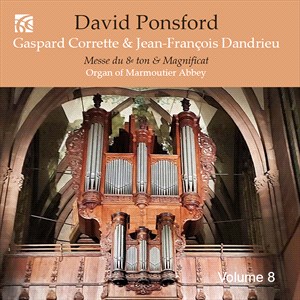

Gaspard Corrette: Messe du 8e ton pour l'orgue Jean-François Dandrieu: - Pièces d'orgue (Premier Livre) - Magnificat en Ré mineur
The main merit of this new pipe organ recording lies in its historical importance and perspective, most notably in how it exposes the core differences between French and German organists and composers of the Baroque era, or more specifically the conceptual musical differences between these two composers and their contemporary counterpart, Johann Sebastian Bach. The obvious disparity between rather short pieces, filled with ornamental filigree, harmonic grace and refinement, and the extensive toccatas, fantasias, and preludes and fugues of the latter. Not to say that this music is insignificant or lacking substance. Quite the contrary, along with the music of Clérambault and Daquin, it exemplifies the splendour of the French Rococo period.
Most of the following information is derived from the booklet notes by organist David Ponsford himself. Gaspard Corrette (c.1671-c.1733), [not to be confused with his son Michel Corrette], with the assistance of Rouen Cathedral organist and composer Jacques Boyvin, became organist of the parish church of Saint-Herbland, whose organ rivalled that of the cathedral in scope and size. Corrette's Messe du 8e ton pour l'orgue was his only publication. It's full of originality and interest. We are fortunate that Corrette wrote an extensive preface to the volume, detailing which ranks of pipes should be drawn for each genre, which we were able to follow precisely during the recording. Corrette added remarks relevant to the character of each piece as well as an ornament table, making his preface one of the most valuable performance-practice documents relating to organ music of this period. On the death of Boyvin in 1706, Corrette applied for the post at Rouen Cathedral, but was defeated by another pupil of Boyvin, François d'Agincourt.
Despite these two composers being almost contemporary, the thoroughly 17th century French style of Corrette's music makes an interesting musical contrast with the more 18th century style of Jean-François Dandrieu (c.1682-1738), with his evident leaning towards more German compositional procedures. This, I think, is what makes Dandrieu's music so attractive to modern audiences that are well used to the music of Bach.
The pipe organ used for this recording, is the magnificent Andreas Silbermann Organ of Saint-Étienne, Marmoutier, Alsace. One key reason why you should acquire this CD is to read the detailed booklet notes that reveal the long and arduous history of this instrument, from its original build in 1709 to this recording in 2023. You will even find out that Andreas Silbermann was stabbed by a disgruntled cabinet maker, dismissed because of his disorderly drinking habits.
And again from the booklet notes: David Ponsford is an organist, harpsichordist, musicologist and conductor, and an authority on keyboard music of the seventeenth and eighteenth centuries. He studied organ with Peter Hurford, Lionel Rogg and Piet Kee, and harpsichord with Kenneth Gilbert and Gustav Leonhardt. David has been Publications Officer for the British Institute of Organ Studies, and together with Anne Page founded the Cambridge Academy of Organ Studies. Recently, he has given concerts in Singapore, Poland, Germany, New York and Montreal.
Jean-Yves Duperron - January 2024 Corrette - Messe - Concert pour les flÛtes Dandrieu - Magnificat - Dialogue (sur les grands jeux)